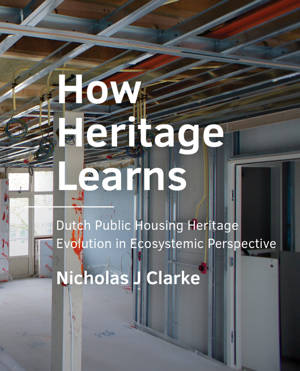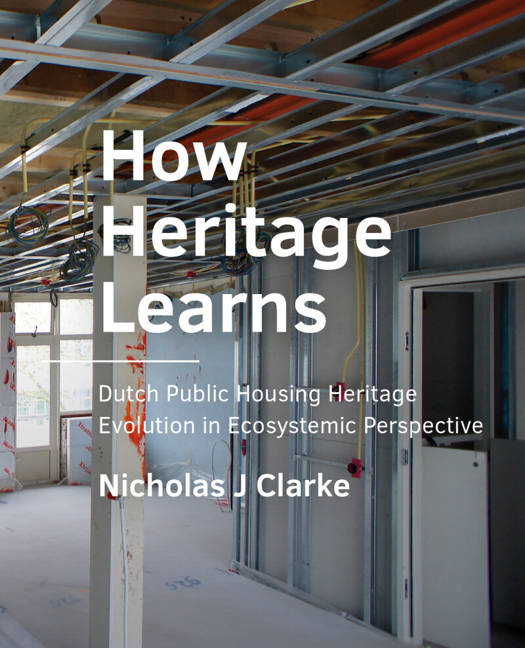
- Retrait gratuit dans votre magasin Club
- 7.000.000 titres dans notre catalogue
- Payer en toute sécurité
- Toujours un magasin près de chez vous
- Retrait gratuit dans votre magasin Club
- 7.000.0000 titres dans notre catalogue
- Payer en toute sécurité
- Toujours un magasin près de chez vous
How Heritage Learns
Dutch Public Housing Heritage Evolution in Ecosystemic Perspective
Nicholas Clarke
45,95 €
+ 91 points
Description
How Heritage Learns explores the dynamics that come into play when public housing becomes valourised as heritage in the Netherlands and how that, in turn modulates the evolution of this protected housing. It builds on the foundation set by the thesis of Steward Brand, that buildings learn through the adaptation of their fabric to external forces: changing fashion, technologies and economy. This dissertation investigates different key drivers for change: Energy, Economy and Comfort (2E+Co).
To understand how and why the housing heritage evolved over time, an ecology of ideas is developed that sees buildings as organisms evolving and learning in their environments, providing a multi-sided theoretic model for analysis.
Three case studies are extensively explored: the Justus van Effen Quarter in Rotterdam (1921–22) and the King’s Wives of Landlust (1937–38) and Jeruzalem public housing complexes (1949–52), both in Amsterdam. These are all exemplary monuments of Dutch public housing and all three have undergone repeat renovations since their construction. The research not only highlighted their various learning cycles, but also uncovered exciting new information on their origins and histories.
What sets public housing heritage apart is the presence of a Story. However, the case studies reveal that the Stones were modulated by dominant 2E+Co ambitions common to all public housing. Above all, How Heritage Learns shows that past promises of increased performance and efficiency were never fulfilled. Without structured reflective observation we are doomed to repeat the same mistakes. Such lessons are all the more important at a time when the built environment stands at the cusp of another revolution driven by environmental imperatives.
To understand how and why the housing heritage evolved over time, an ecology of ideas is developed that sees buildings as organisms evolving and learning in their environments, providing a multi-sided theoretic model for analysis.
Three case studies are extensively explored: the Justus van Effen Quarter in Rotterdam (1921–22) and the King’s Wives of Landlust (1937–38) and Jeruzalem public housing complexes (1949–52), both in Amsterdam. These are all exemplary monuments of Dutch public housing and all three have undergone repeat renovations since their construction. The research not only highlighted their various learning cycles, but also uncovered exciting new information on their origins and histories.
What sets public housing heritage apart is the presence of a Story. However, the case studies reveal that the Stones were modulated by dominant 2E+Co ambitions common to all public housing. Above all, How Heritage Learns shows that past promises of increased performance and efficiency were never fulfilled. Without structured reflective observation we are doomed to repeat the same mistakes. Such lessons are all the more important at a time when the built environment stands at the cusp of another revolution driven by environmental imperatives.
Spécifications
Parties prenantes
- Auteur(s) :
- Editeur:
Contenu
- Nombre de pages :
- 554
- Langue:
- Anglais
- Collection :
Caractéristiques
- EAN:
- 9789463664387
- Date de parution :
- 25-06-21
- Format:
- Livre broché
- Dimensions :
- 191 mm x 235 mm
- Poids :
- 1269 g

Les avis
Nous publions uniquement les avis qui respectent les conditions requises. Consultez nos conditions pour les avis.






